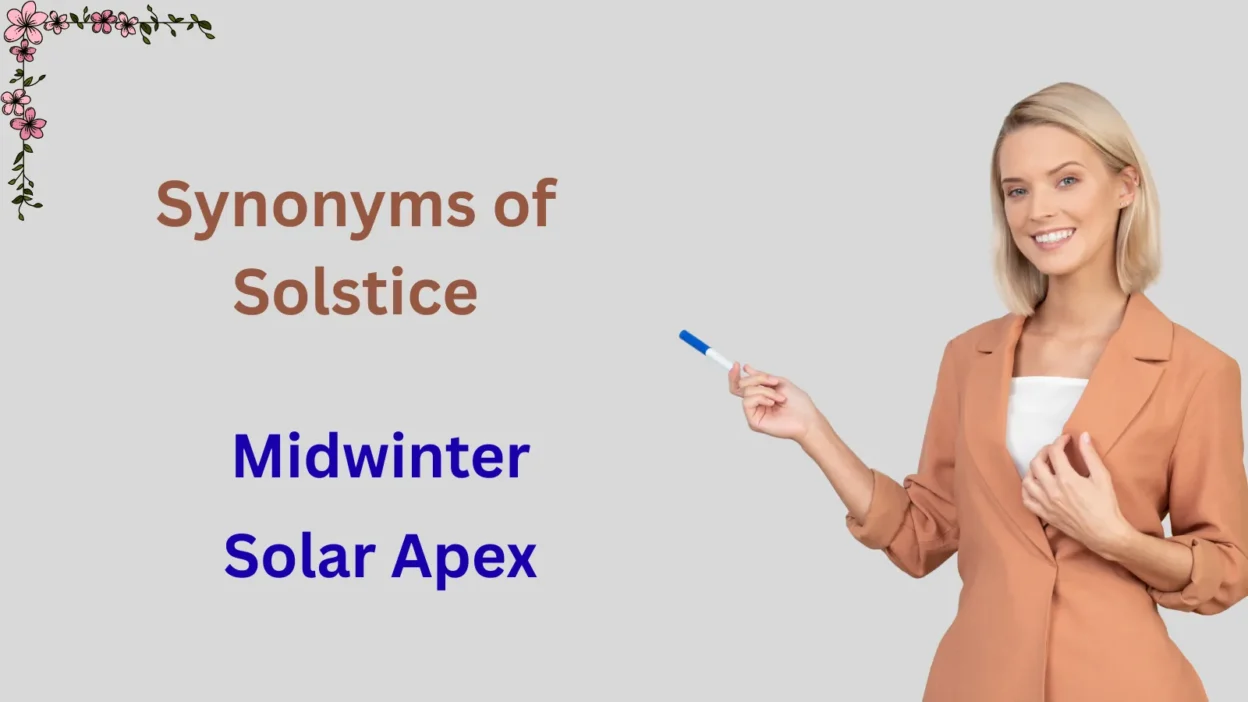Synonyms of Solstice help describe the two times of the year when the sun reaches its highest or lowest point in the sky, such as midyear, sunpeak, or longest day/night. For example, the summer solstice marks the longest day of the year in the Northern Hemisphere. Using the right synonym of solstice allows you to highlight different aspects of astronomical events, seasonal changes, or cultural celebrations. Each word adds clarity and nuance when discussing the sun’s position and the turning of the seasons.
If you’re writing about astronomy, seasons, or cultural traditions, choosing precise synonyms for solstice makes your descriptions accurate, engaging, and easy to understand.
In this article, you’ll get the meaning and example sentences for each synonym of solstice, so you can discuss these celestial events with confidence and clarity. Ready to explore the fascinating world of solstices? Let’s dive in!
What Does Solstice Mean?
At its core, solstice refers to the moment when the sun appears at its highest or lowest point in the sky at noon, resulting in the longest or shortest day of the year. It’s often:
- Astronomically significant
- Marked by seasonal change
- Observed in many cultures
- A time for reflection or celebration
It’s not just a date on the calendar—it’s a natural milestone that shapes seasons, traditions, and our connection to the sky. Think of solstice as nature’s rhythm, guiding the passage of time through light and shadow.
30 Synonyms of Solstice with Usage Guidance
1. Midwinter
Meaning: Refers to the depth of winter, often linked to the winter solstice.
Example: “Festivals were held during midwinter to celebrate the return of light.”
Use When: Highlighting cultural or seasonal traditions.
2. Midsummer
Meaning: Refers to the height of summer, connected to the summer solstice.
Example: “The village hosted a midsummer celebration.”
Use When: Writing about festivals, folklore, or seasonal joy.
3. Turning Point
Meaning: A critical change or moment of transition.
Example: “The solstice was seen as a turning point in the cycle of the year.”
Use When: Metaphorical, symbolic, or literary writing.
4. Sun’s Zenith
Meaning: The highest point of the sun in the sky.
Example: “At the solstice, the sun’s zenith brings the longest day.”
Use When: Scientific or descriptive astronomical contexts.
5. Solar Apex
Meaning: The peak position of the sun’s movement.
Example: “The solar apex marked the season’s change.”
Use When: Formal, astronomical, or poetic use.
6. Day of Longest Light
Meaning: Refers specifically to the summer solstice.
Example: “The day of longest light inspired ancient rituals.”
Use When: Informal or cultural description.
7. Day of Deepest Darkness
Meaning: Refers specifically to the winter solstice.
Example: “The day of deepest darkness was a symbol of renewal.”
Use When: Symbolic, cultural, or literary settings.
8. Seasonal Apex
Meaning: The highest point in the seasonal cycle.
Example: “The seasonal apex divides the year into light and dark halves.”
Use When: Academic, scientific, or cyclical explanations.
9. Cosmic Threshold
Meaning: A boundary or gateway in celestial cycles.
Example: “Ancients viewed the solstice as a cosmic threshold.”
Use When: Spiritual, mystical, or metaphorical writing.
10. Celestial Turning
Meaning: A shift in the celestial pattern of the sun.
Example: “The celestial turning was marked with bonfires and dances.”
Use When: Poetic or cultural contexts.
11. Light’s Peak
Meaning: The maximum daylight of the year.
Example: “At light’s peak, people celebrated fertility and harvest.”
Use When: Symbolic or seasonal storytelling.
12. Shadow’s Depth
Meaning: The minimal daylight of the year.
Example: “Shadow’s depth was a time for reflection and hope.”
Use When: Literary or emotional contexts.
13. Sunshift
Meaning: A creative term for the sun’s directional change.
Example: “The solstice marked a powerful sunshift.”
Use When: Poetic or contemporary metaphor.
14. Seasonal Pivot
Meaning: The moment when seasonal change takes a decisive turn.
Example: “The seasonal pivot defined agricultural calendars.”
Use When: Academic, cultural, or metaphorical writing.
15. Solar Standstill
Meaning: Refers to the Latin root of solstice (solstitium: “sun standing still”).
Example: “The solar standstill was carefully tracked by ancient astronomers.”
Use When: Historical, etymological, or scientific contexts.
16. Heliocentric Pause
Meaning: The apparent pause of the sun’s motion at the solstice.
Example: “The heliocentric pause puzzled early skywatchers.”
Use When: Technical or descriptive astronomy.
17. Longest Day
Meaning: Direct synonym for summer solstice.
Example: “The longest day was filled with music and dance.”
Use When: Everyday, cultural, or descriptive usage.
18. Shortest Day
Meaning: Direct synonym for winter solstice.
Example: “The shortest day symbolized endurance and faith.”
Use When: Seasonal, emotional, or symbolic use.
19. Solar Culmination
Meaning: The high point of the sun’s path.
Example: “Solar culmination determined ancient calendars.”
Use When: Technical or academic astronomy.
20. Season’s Crown
Meaning: The peak or glory of a season.
Example: “The solstice was seen as the season’s crown.”
Use When: Literary or metaphorical use.
21. Equinoctial Contrast
Meaning: A term contrasting solstices with equinoxes.
Example: “The equinoctial contrast highlighted the extremes of day and night.”
Use When: Scientific or comparative explanation.
22. Solar Summit
Meaning: The top point of the sun’s yearly journey.
Example: “The solar summit was awaited with reverence.”
Use When: Poetic, astronomical, or celebratory use.
23. Celestial Pause
Meaning: A perceived stillness in the sun’s movement.
Example: “The celestial pause marked renewal in many cultures.”
Use When: Spiritual or symbolic contexts.
24. Season’s Turning
Meaning: A point of major seasonal change.
Example: “The season’s turning was celebrated with rituals of hope.”
Use When: Literary, cultural, or historical narratives.
25. Astronomical Turning Point
Meaning: A key moment in the sun’s apparent movement.
Example: “The astronomical turning point guided navigation and farming.”
Use When: Technical or scientific explanation.
26. Sun’s Standstill
Meaning: Another way to say solar standstill, tied to etymology.
Example: “At the sun’s standstill, ancient monuments aligned perfectly.”
Use When: Historical, etymological, or symbolic writing.
27. Seasonal Balance Shift
Meaning: A change in balance between light and darkness.
Example: “The seasonal balance shift marked the year’s cycle.”
Use When: Spiritual or metaphorical contexts.
28. Cosmic Pause
Meaning: The halting moment of celestial rhythm.
Example: “They believed the cosmic pause brought renewal.”
Use When: Mystical, cultural, or poetic descriptions.
29. Light-Dark Divide
Meaning: The symbolic contrast of the longest and shortest days.
Example: “The light-dark divide symbolized hope and struggle.”
Use When: Literary or symbolic tone.
30. Solar Threshold
Meaning: A gateway between two seasonal halves.
Example: “The solar threshold was honored with rituals.”
Use When: Cultural, spiritual, or poetic narratives.
Choosing the Right Synonym Based on Tone and Context
- Scientific & Astronomical Writing: Use solar standstill, solar culmination, heliocentric pause, and astronomical turning point.
- Cultural & Historical Contexts: Use midwinter, midsummer, seasonal pivot, season’s turning.
- Poetic & Literary Writing: Use cosmic pause, light’s peak, shadow’s depth, sunshift, season’s crown.
- Everyday or Informal Usage: Use longest day, shortest day, turning point, day of deepest darkness.
Cultural Note: In many traditions, the solstice is not just scientific—it carries themes of rebirth, renewal, and transformation. For instance, winter solstice festivals often symbolize hope during darkness, while summer solstice events celebrate abundance and vitality.
Conclusion
Exploring synonyms of solstice helps you describe these pivotal astronomical events with clarity and precision. Whether you use terms like midyear, sunpeak, or longest day/night, each word highlights a unique aspect—seasonal change, cultural significance, or celestial timing.
Using the right synonym makes your writing more engaging, accurate, and easy to understand. Next time you discuss the turning of the seasons or cultural celebrations, these alternatives allow you to explain solstices clearly while adding depth and style to your content.
Embrace the language of the skies and let your descriptions of solstices shine with confidence and clarity.





